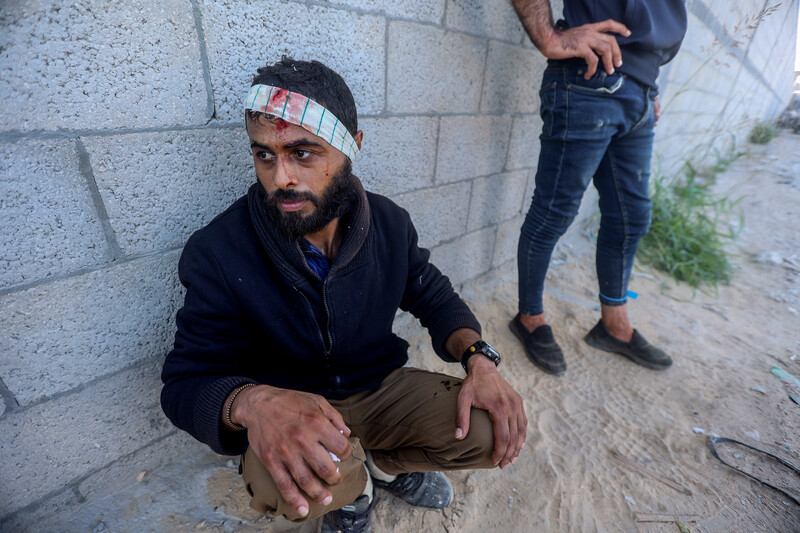Rights and Accountability 6 November 2023

A Palestinian worker with a bandage covering his bleeding forehead, and another worker with a blue number tag on his ankle, after they crossed back into Gaza through an Israeli military checkpoint.
ZUMA PressIsrael detained and tortured Palestinian workers from Gaza who were present lawfully in the country when the events of 7 October unfolded.
Thousands of laborers who live in the Gaza Strip had permits to work in Israel when the Hamas-led operation in Israel’s southern colonies began on that October morning.
The Israeli authorities arrested laborers who were already present inside Israel and held them in at least two facilities. The conditions of detention were “extremely dire,” according to Israeli human rights group Gisha.
Many of the laborers were released in early November and forced to return to the Gaza Strip, which Israel has been relentlessly bombing and committing daily massacres in, wiping out entire families, for 31 days.
For the duration of their captivity, workers were “cut off from the world,” according to Gisha, and allowed no legal representation.
“At a certain point, an officer told the detainees that they were being held because there were Israeli hostages in Gaza, and that as long as the Israeli hostages were in Gaza, there was no prospect of the workers’ release,” human rights groups based in Israel said in a statement.
Gisha said it had reason to believe workers were held in “inhumane conditions.”
Workers revealed how Israeli authorities physically and psychologically abused them, and even affixed blue tags bearing identification numbers around their wrists and ankles.
The resemblance was not lost on Twitter users who posted images of the tattoos bearing numbers of inmates in Nazi concentration camps.After reentering Gaza through Kerem Shalom – an Israeli military checkpoint and crossing for goods – laborers told journalists that they had been tortured, beaten, humiliated and interrogated by Israeli authorities.
“No one showed us mercy. The army did not show mercy towards us, no Israeli authority extended any mercy,” one worker told media.
The Kerem Shalom checkpoint is the only place Israel allows goods in and out of Gaza, but it’s not generally used for the entry or departure of people. Israel closed the checkpoint to punish the entire population of Gaza since the beginning of its assault on the Strip.
The worker, not identified by the news outlet, was praying for the safety and well-being of the wives and children of the laborers.
“They did not let us work, they took our money, took our clothes and took off our shoes,” the worker continued.
“They left nothing on us,” he added.
“They left us naked, for three days I was tortured while completely nude,” the laborer added.
“This is how they stepped on our heads, beat, punched and kicked us, and even now, I am in pain from their beatings, breaking and torture.”
The worker said it was his employer who handed him over to Israeli authorities.
One worker told media that Israeli authorities interrogated him to obtain information about Hamas and the underground tunnel network in Gaza.He added that Israeli interrogators used electric chairs against the workers.
During the weeks when the workers had been missing, human rights groups based in Israel had submitted individual inquiries, a petition and a letter to Israeli authorities demanding that they “disclose the names and whereabouts of all Gaza residents.”Gisha and HaMoked, another Israeli human rights group, had submitted a second petition to Israel’s high court on 2 November.
Itamar Ben-Gvir, Israel’s national security minister, had issued an order to consider Palestinian detainees from Gaza as “unlawful combatants” in accordance with a law from 2002, Palestinian prisoners rights group Addameer reported on 19 October.
Israel had ordered that Palestinian laborers from Gaza be held in a newly-established military camp near the city of Beersheba in southern Israel, under an article of that law, Addameer added.
Before the events of 7 October, more than 18,000 Palestinians in Gaza had permits to work in Israel. Many of them were in Israel when the Hamas-led operation began that morning, but the exact number is unknown, according to rights groups.
Workers who were stranded in Israel feared for their lives, and some tried to enter the occupied West Bank for shelter.
On 10 October, COGAT, the bureaucratic arm of Israel’s military occupation, revoked all permits that had been issued to Palestinians from Gaza. The permits will not be reinstated, COGAT has insisted.
Because of that move, laborers from Gaza were deemed to be “illegal aliens” in Israel, despite the fact that they entered lawfully.
“Some were detained violently in Israel, others at checkpoints en route to the West Bank, and some even in areas of the West Bank controlled by the Palestinian Authority,” human rights groups said.
The Israeli authorities decided to transfer workers back to Gaza on 2 November as part of its cutting “off all contact with Gaza,” the Israeli prime minister’s office said.
“There will be no more Palestinian workers from Gaza and the workers who were in Israel on the day the war broke out will be returned to Gaza.”
By quashing all permits for Palestinian laborers in Gaza to work, Israel has apparently resorted to a form of collective punishment.
It is not clear if all workers have been released yet, Gisha said. In the group’s understanding, the return of some workers to Gaza is a partial implementation of the Israeli authorities’ decision.




